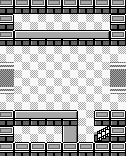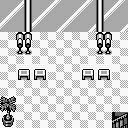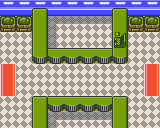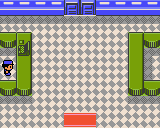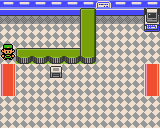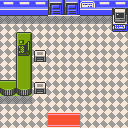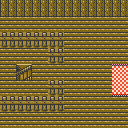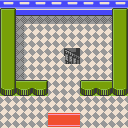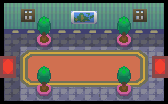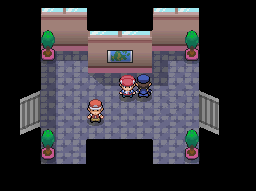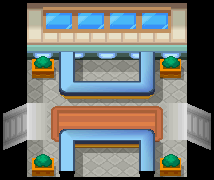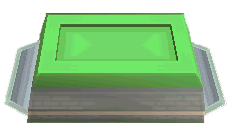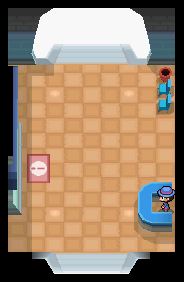Gate
Gates (Japanese: ゲート gate) are prominent features of routes in the Pokémon world. They are located at junctions between different routes, or placed between a route and a city.
In the games
Generation I
In Generation I, gates serve to separate two areas and to guard the corresponding route, which is why a gatekeeper usually resides inside. Upon speaking to the gatekeeper, they may offer words of advice or information about the route or city that the gate guards.
Gates usually share the background music with one of the two or more areas that they connect and this remained a consistent element of gates up to Generation V, where gates finally received their own background music. Gates aren't locations on their own either, which is another element that was changed in Generation V, where gates are now locations by themselves.
Certain gates contain a second floor that features a spot where binoculars can be used to see faraway landmarks or even certain Pokémon. In some of these, the player will usually encounter one of Professor Oak's aides. He will check the Pokédex and will reward the player if he or she has caught a given number.
Seven gates block the player from passing them until he meets certain requirements:
- give a Fresh WaterRGBRBY, Soda PopRGBRBY, LemonadeRGBRBY, purchasable at the Celadon Department Store to the thirsty gatekeeper at the gates on Routes 5, 6, 7 and 8, all of which lead to Saffron City;
- obtain the Bicycle so that the gatekeeper at the gates on Routes 16 and 18 allows the player to go through and enter Cycling Road;
- obtain all 8 Gym Badges and show each one to the 8 gatekeepers at the Pokémon League Front Gate on Route 22 and at Route 23 to grant access to Victory Road and Indigo Plateau.
Riding the Bicycle inside the gates is not possible in Generation I.

|
This section is incomplete. Please feel free to edit this section to add missing information and complete it. Reason: Specific gates with different designs. |
| The exterior of a regular horizontal gate in Generation I |
The interior of a regular horizontal gate in Generation I |
The ground floor of a two-story horizontal gate in Generation I |
The second floor of a two-story horizontal gate in Generation I |
Pokémon League Reception Gate
| The interior of Pokémon League Reception Gate in Generation I |
The exterior of Pokémon League Reception Gate in Generation I |
Generation II
Much like Generation I, gates serve to separate two areas. Unlike other buildings, the player can often ride their Bicycle through these buildings to guarantee fast transportation. None of the gates have second floors, including those in Kanto that had them in Generation I.
At the gate leading to Route 35, to the north of Goldenrod City, is gatekeeper Randy, a non-player character, who will give a Spearow to the player that holds Mail to be delivered to his friend on Route 31.
Four gates forbid the player to enter until he/she meets certain requirements:
- in Ecruteak City, the player must have the Rainbow WingGSHGSS and the Clear BellCHG or Tidal BellSS to pass the gate that leads to Bellchime Trail (a location that is unnamed and considered part of Ecruteak City in Generation II), the small area outside Bell Tower;
- $1,000 must be paid (if the player has at least that amount of money) to either Team Rocket Grunt at the gate on Route 43 next to the southernmost gate that connects to Mahogany Town but only before defeating Team Rocket at Team Rocket HQ (called Rocket Hideout in Generation II);
- the Bicycle is required so that the gatekeeper at the gates on Routes 16 and 18 allows the player to go through and enter Cycling Road;
| The interior of a regular horizontal gate in Generation II | The interior of a regular vertical gate in Generation II | The exterior of Goldenrod City and Mahogany Town gate in Generation II | The exterior of Route 43 gate in Generation II | The exterior of Battle Tower in Generation II |

|

| |||
| The exterior of Route 29-46 and Route 36-Ruins of Alph gate in Generation II | The exterior of Route 32-Ruins of Alph and Violet City-Route 31 gate in Generation II | The exterior of Ecruteak City-Route 38/42 gate in Generation II | The exterior of a regular horizontal gate in Generation II Kanto | The exterior of a regular vertical gate in Generation II Kanto |
National Park
| Outer horizontal National Park gate in Generation II | Outer vertical National Park gate in Generation II | Inner horizontal National Park gate in Generation II | Inner vertical National Park gate in Generation II | Interior of horizontal National Park gate in Generation II | Interior of vertical National Park gate in Generation II |
Bellchime Trail
| The entrance gate in Generation II | The exit gate in Generation II | 1F in Generation II | 2F in Generation II | 3F in Generation II |
Vermilion and Olivine Ports
| The exterior of Olivine Port gate in Generation II | The exterior of Vermilion Port gate in Generation II | The interior of port gate in Generation II | The B1F of port gate in Generation II |
Pokémon League Reception Gate
| The exterior of Pokémon League Reception Gate on Routes 22 and 28 in Generation II | The exterior of Pokémon League Reception Gate on Route 26 in Generation II | The interior of Pokémon League Reception Gate in Generation II |
Underground Path
| The exterior of Routes 5-6 Underground Path in Generation II | The 1F of Routes 5-6 Underground Path in Generation II | The B1F of Routes 5-6 Underground Path in Generation II | The Route 7's exterior of Underground Path in Generation II | The Route 8's exterior of Underground Path in Generation II |
Generation III
Gates are sparse in the Hoenn-based Generation III games. There are only two gates, each connected to the Seaside Cycling Road. Players may not ride Bicycles as they travel away from Seaside Cycling Road, but are forced upon their Bicycle if traveling towards it. If the Bicycle has not been obtained, the gatekeeper does not allow the player to enter Seaside Cycling Road.
In FireRed and LeafGreen, which are set in Kanto, gates serve the same purpose as in Generation I. The only significant change is that since players can now trade items attached to a Pokémon, the key item Tea was introduced to prevent the player from advancing through the gates surrounding Saffron City prematurely. This key item serves the same purpose as the drink from the original games. Gates also exist in the Sevii Islands, giving access from the port to each town; however, they are not used to connect areas, being instead both the entrance and exit points for the Seagallop Ferries.
The only common gates to both Hoenn and Kanto are the ones at Navel Rock and Birth Island.
| Picture | Description |
|---|---|

|
The exterior of the gates at Seaside Cycling Road in Ruby, Sapphire, and Emerald. |
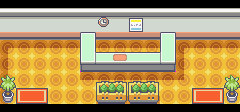
|
The interior of the gates at Seaside Cycling Road in Ruby, Sapphire, and Emerald. |

|
The exterior of a regular horizontal gate in Kanto in FireRed and LeafGreen. |
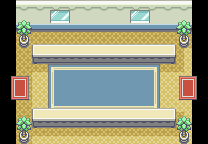
|
The interior of a regular horizontal gate in Kanto in FireRed and LeafGreen. |
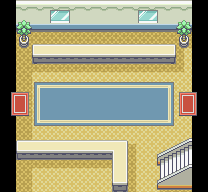
|
The ground floor of a two-story horizontal gate in Kanto in FireRed and LeafGreen. |
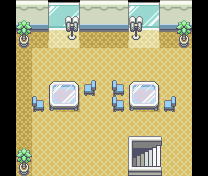
|
The second floor of a two-story horizontal gate in Kanto in FireRed and LeafGreen. |

|
The exterior of the ports at the Sevii Islands in FireRed and LeafGreen. |
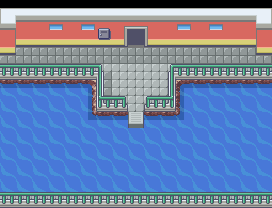
|
The interior of the ports at the Sevii Islands in FireRed and LeafGreen. |

|
The exterior of the ports in Navel Rock and Birth Island in Emerald. |
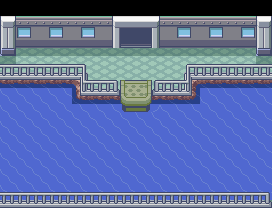
|
The interior of the ports in Navel Rock and Birth Island in Emerald. |
Generation IV
Much like in past generations, the gates in Generation IV serve to separate two areas. In Diamond and Pearl, the player cannot ride their Bicycle through these buildings, but this limitation was lifted in Platinum and HeartGold and SoulSilver. Female gatekeepers were introduced in this generation.
In the Sinnoh-based games, most gates don't have gatekeepers to watch over the route, but other travelers can be found inside, as well as a map showing the player's current location.
Four gates have restrictions, however:
- two of them are the gates at Route 206 as they are the entrance and/or exit for Cycling Road;
- one is at Hearthome City, which connects to Route 209 and requires the player to have met FantinaDP or to have defeated herPt;
- one gate connecting to Route 212 is blocked by a reporter and a cameraman for shooting, which can't be passed until Veilstone Gym is defeated.
- and the other one is at Fight Area, requiring the player to have the National Pokédex.
In HeartGold and SoulSilver, set in Johto and in Kanto, the gates are similar to those in Generation II and the gatekeepers in charge of guarding them are reinstated. Like in Generation II, there are no gates with second floors, taking into account those in Kanto that had them in FireRed and LeafGreen.

|
This section is incomplete. Please feel free to edit this section to add missing information and complete it. Reason: Exteriors of regular gates and interior maps of the gates in Platinum |
| The interior of a regular horizontal gate in Diamond and Pearl | Lucas, an officer, and a Fisherman inside a gate in Platinum |
The interior of a regular horizontal gate in HeartGold and SoulSilver |
Generation V
There are gates on several routes in Unova, each with a gatekeeper. Gates now have ゲート Gate as background music, and each gate has a specific name (e.g.: Opelucid Gate). These names appear in-game when saving inside a gate and/or on the summary page of a Pokémon hatched inside a gate. Due to this, gates are now locations by themselves.
Another new feature of gates in Generation V is the introduction of an electronic bulletin board and a screen on one of the walls. The electronic bulletin board displays the current date, the weather in a few adjacent routes and towns (including what location a windstorm or thunderstorm is brewing at), information about a nearby town or city, and information about where Pokémon are swarming (once the player has obtained the National Pokédex). The screen shows images from the connected location. Also in these gates are a trash can and two chairs for a quick rest.
There are also some gates that only connect bridges and that have unique designs, though these gates don't have electronic bulletin boards and monitors.
Two gates in Black and White impose certain requirements from the player to allow him/her to pass:
- in Accumula Town, Accumula Gate is blocked by two Team Plasma Grunts until Ghetsis talks to the citizens and the player battles N;
- Bianca will not let the player pass the Nimbasa Gate on Route 5 before she shows him/her the Musical Theater in Nimbasa City.
In Black 2 and White 2, two other gates instead have restrictions for the player and are the Bridge Gates at Marine Tube.
Six gates initially inaccessible by the player are shared between Black and White and Black 2 and White 2:
- both Black GatesBB2 or White GatesWW2 on Routes 14 and 15 by some men;
- the Bridge Gates to Tubeline Bridge on Routes 8 and 9.

|
This section is incomplete. Please feel free to edit this section to add missing information and complete it. Reason: Exteriors of regular gates and interior maps of the gates |
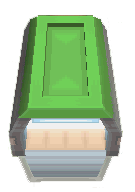
| |
| The exterior of the horizontal gates in Black, White, Black 2 and White 2 | The exterior of the vertical gates in Black, White, Black 2 and White 2 |
| Hilbert inside Black Gate in Pokémon Black | Nate inside Aspertia Gate in Black 2 and White 2 |
Practical use
The gates also have a practical use within the games' programming. As a player moves from a route to a town or city, the map's textures (tilesets in the first three generations) must be loaded for each. While this is easy when a city connects to relatively few routes, where all can use the same tileset/texture, areas like Saffron City and Hearthome City, which connect to many different areas, would need to load multiple tilesets/textures, which would end up crashing the game due to the system not having enough RAM to hold multiple tilesets/textures. The programmers broke up the overworld with these gates to assure crash-free gameplay, and to properly display the routes, towns and cities.
In the Generation IV games, a player can use a "walk through walls" cheat to go from location to location without going through the gates. By doing this, the map textures work as expected, except for many of them appearing as white tiles. Some buildings seem to be invisible as well. The cheat can also be used in the Generation V games; however, the texture problem is very limited, if not completely absent.
List of gates
Kanto
| Connecting areas | Notes | |
|---|---|---|
| Route 1 | Viridian City | Only present in HeartGold and SoulSilver. |
| Route 5 | Saffron City | The gatekeeper requires a Fresh Water, Soda Pop, or Lemonade to allow the player to pass in Generation I, or Tea in FireRed and LeafGreen. |
| Route 6 | Saffron City | The gatekeeper requires a Fresh Water, Soda Pop, or Lemonade to allow the player to pass in Generation I, or Tea in FireRed and LeafGreen. |
| Route 7 | Saffron City | The gatekeeper requires a Fresh Water, Soda Pop, or Lemonade to allow the player to pass in Generation I, or Tea in FireRed and LeafGreen. |
| Route 8 | Saffron City | The gatekeeper requires a Fresh Water, Soda Pop, or Lemonade to allow the player to pass in Generation I, or Tea in FireRed and LeafGreen. |
| Vermilion City | Vermilion Port* | Only present in Generation II and HeartGold and SoulSilver. This gate is used to access Vermilion Port, where the player is able to go on Sundays and Wednesdays in order to ride the S.S. Aqua to Olivine City in Johto. |
| Route 11 | Route 12 | Has a second floor in Generation I and FireRed and LeafGreen. This gate is absent in Generation II. |
| Route 12 Route 11 (southwest) Route 13 (south) |
Rest of Route 12 itself Lavender Town (north) |
Has a second floor in Generation I and FireRed and LeafGreen. This gate is absent in Generation II and HeartGold and SoulSilver. A girl in the second floor will give the player TM39 (Swift)RGBRBY or TM27 (Return)FRLG. In all games it is present, it is required to be passed through if coming from either north or south of Lavender Town. |
| Route 15 | Fuchsia City | Has a second floor in Generation I and FireRed and LeafGreen. |
| Route 16 | Celadon City | Has a second floor in Generation I and FireRed and LeafGreen. Allows access to Cycling Road, which requires the player to have a Bicycle. |
| Route 18 | Fuchsia City | Has a second floor in Generation I and FireRed and LeafGreen. Allows access to Cycling Road, which requires the player to have a Bicycle. |
| Route 19 | Fuchsia City | Only present in Generation II and HeartGold and SoulSilver. |
| Fuchsia City | Safari ZoneRGBRBYFRLG Pal ParkHGSS |
First gate within a town. This gate is closed in Generation II, although it remains in code, where it leads players to the unused and incomplete Safari Zone. |
| Route 22 (south)RGBRBYFRLG Route 22 (east)GSCHGSS Route 26 (south)GSCHGSS Route 28 (west)GSCHGSS |
Route 23 (north)RGBRBYFRLG Victory RoadGSCHGSS |
This gate is known as the Pokémon League Front Gate in Generation I and FireRed and LeafGreen and as Pokémon League Reception Gate in Generation II and HeartGold and SoulSilver. In Generation I and FireRed and LeafGreen, it contains the Boulder Badge checkpoint, which can only be passed if the gatekeeper recognizes the player as being in possession of the Badge. In Generation II and HeartGold and SoulSilver, this gate is a four-way intersection, being the only one so far in the core series games that is not located in a populated area. |
Johto
| Connecting areas | Notes | |
|---|---|---|
| Route 29 | Route 46 | |
| Route 31 | Violet City | Lyra or Ethan will give the player the Vs. Recorder in HeartGold and SoulSilver. |
| Route 32 | Ruins of Alph | |
| Route 35 | Goldenrod City (south) | Gatekeeper Webster, called Randy in Generation II, will give away a Spearow with mail to deliver to his friend on Route 31. |
| Route 35 | National Park (north) Pokéathlon DomeHGSS (northwest) |
This gate is far bigger in HeartGold and SoulSilver to accomodate the connection to the path that leads to the Pokéathlon Dome. The gatekeeper is in charge of the Bug-Catching Contest, which is held every Tuesday, Thursday, and Saturday. |
| Route 36 | National Park | The gatekeeper is in charge of the Bug-Catching Contest, which is held every Tuesday, Thursday, and Saturday. |
| Route 36 | Ruins of Alph | |
| Route 36 | Violet City | Only present in HeartGold and SoulSilver. |
| Ecruteak City | Bellchime Trail* | Connects Ecruteak City to Bell Tower. Bellchime Trail is the small location in between them but it is only identified as such in HeartGold and SoulSilver, as it is unnamed and recognized as part of Ecruteak City in Generation II. This gate contains a few monks who serve as its gatekeepers. The Wise Trio guard the last floor of this gate in Crystal. The player must have the Rainbow WingGS or the Clear BellC to pass. In HeartGold and SoulSilver, both Rainbow Wing and Clear BellHG or Tidal BellSS are required. |
| Route 38 | Ecruteak City | |
| Olivine City | Olivine Port | This gate is used to access Olivine Port, where the player is able to go on Mondays and Fridays in order to ride the S.S. Aqua to Vermilion City in Kanto. |
| Route 40 | Battle TowerC Frontier AccessHGSS |
In Crystal, passing this gate will lead the player directly to the small area outside the Battle Tower. In HeartGold and SoulSilver, this gate leads the player to the Frontier Access, a small town south of the Battle Frontier that serves as a staging area for the facility's challengers. |
| Route 42 | Ecruteak City | |
| Route 43 | Mahogany Town | |
| Route 43 | Rest of Route 43 itself Lake of Rage (north) |
If the player enters this gate before defeating Team Rocket at Team Rocket HQ (called Rocket Hideout in Generation II), they will be forced to pay $1,000. If the player has less than $1,000, they will not be charged. |
| Route 48 | Safari Zone | Only in HeartGold and SoulSilver. Known as the Safari Zone Gate, it's actually a bazaar outside the Safari Zone, with the gate itself on the northern zone of the area. |
Hoenn
| Connecting areas | Notes | |
|---|---|---|
| Route 110 (south) | Route 110 (north) | Entrance to Seaside Cycling Road. |
| Route 110 (north) | Route 110 (south) | Entrance to Seaside Cycling Road. |
Sinnoh
| Connecting areas | Notes | |
|---|---|---|
| Route 206 | Eterna City | Entrance to Cycling Road. Rowan's aide will give players the Exp. Share after they have seen at least 35 Pokémon on their Pokédex. |
| Route 206 | Rest of Route 206 itself Route 207 (south) |
Entrance to Cycling Road. It is the first gate that doesn't bring the player into a separate area. |
| Route 208 | Hearthome City | |
| Route 209 | Hearthome City | This gate is blocked until the player meets FantinaDP or until the player defeats herPt. |
| Route 212 | Hearthome City | This gate is blocked by a reporter and a cameraman for filming until the player helps Dawn/Lucas defeat 2 male Galactic Grunts in Veilstone City. |
| Hearthome City | Amity Square | |
| Route 213 | Pastoria City | |
| Route 214 | Veilstone City | |
| Route 215 | Veilstone City | |
| Route 218 | Jubilife City | The Fisherman will give the player an Old Rod. |
| Route 218 | Canalave City | Rowan's aide will upgrade the player's Pokédex so that they can see a Pokémon's forms. |
| Route 222 | Sunyshore City | |
| Route 225 | Fight Area | This gate is blocked until the player receives the National Pokédex. The person blocking it will give the player a Super Rod after receiving the National Pokédex. |
| Fight Area | Battle ParkDP Battle FrontierPt |
In Diamond and Pearl, passing this gate will lead the player to the Battle Park, where the Battle Tower is located. In Platinum, this gate leads the player directly to the Battle Frontier, due to it replacing the Battle Park. |
| Route 226 | Route 228 | |
Unova
| Connecting areas | English name | Japanese name | Notes | |
|---|---|---|---|---|
| Route 1 | Route 17 | Route Gate | ロードゲート Road Gate | The bulletin board and screen in this gate are turned off. |
| Route 2 | Accumula Town | Accumula Gate | カラクサゲート Karakusa Gate | This gate is blocked by two Team Plasma Grunts until Ghetsis talks to the citizens and the player battles N. |
| Route 3 | Nacrene City | Nacrene Gate | シッポウゲート Shippou Gate | |
| Pinwheel Forest | Skyarrow Bridge | Bridge Gate | ブリッジゲート Bridge Gate | Note that it not only includes the building, but also the overlook. On the outlook, the player cannot ride their Bicycle. |
| Skyarrow Bridge | Castelia City | Bridge Gate | ブリッジゲート Bridge Gate | |
| Route 4 | Castelia City | Castelia Gate | ヒウンゲート Hiun Gate | In Black 2 and White 2, Bianca will give the player the Dowsing MCHN. |
| Route 4 | Nimbasa City | Nimbasa Gate | ライモンゲート Raimon Gate | Inside the gate, Juniper will give ten Ultra Balls to the player and another ten to Cheren. Not present in Black 2 and White 2 as the Join Avenue has taken its place. |
| Desert Resort (outer) Route 4 (east) |
Desert Resort (inner) | Route Gate | ロードゲート Road Gate | This gate doesn't bring the player into a separate area. |
| Route 5 | Nimbasa City | Nimbasa Gate | ライモンゲート Raimon Gate | Bianca will not let the player go in before she shows him/her the Musical Theater in Nimbasa City. |
| Pokémon World Tournament | Driftveil City | (unnamed) | (unnamed) | Only present in Black 2 and White 2. This gate features a different design and does not have a bulletin board screen. As it is considered part of Driftveil City, it does not have an individual name. |
| Route 8 | Tubeline Bridge | Bridge Gate | ブリッジゲート Bridge Gate | This gate features a different design and does not have a bulletin board screen. |
| Route 9 | Tubeline Bridge | Bridge Gate | ブリッジゲート Bridge Gate | This gate features a different design and does not have a bulletin board screen. |
| Route 9 | Opelucid City | Opelucid Gate | ソウリュウゲート Soryu Gate | |
| Route 10 | Opelucid City | Opelucid Gate | ソウリュウゲート Soryu Gate | After gaining the eighth Gym Badge, the gatekeeper will tell the player about an unusual storm on Route 7, meaning that either Tornadus or Thundurus is currently present at the route. This gate can no longer be accessed in Black 2 and White 2 as Route 10 is no longer present. |
| Route 11 | Opelucid City | Opelucid Gate | ソウリュウゲート Soryu Gate | This gate is blocked until the credits roll for the first time and the player receives the National Pokédex. |
| Route 11 | Village Bridge | Bridge Gate | ブリッジゲート Bridge Gate | |
| Route 12 | Village Bridge | Bridge Gate | ブリッジゲート Bridge Gate | The gatekeeper at this gate has a different overworld sprite from the rest of the gatekeepers in Unova, something that she explains herself as having forgotten her uniform. |
| Marine Tube | Humilau City | Bridge Gate | ブリッジゲート Bridge Gate | This gate features a different design and does not have a bulletin board screen. |
| Marine Tube | Undella Town | Bridge Gate | ブリッジゲート Bridge Gate | This gate features a different design and does not have a bulletin board screen, being initially blocked by a Janitor. |
| Route 13 | Undella Town | Undella Gate | サザナミゲート Sazanami Gate | |
| Route 14 | Black City | Black Gate | ブラックゲート Black Gate | This gate is only present in Black and Black 2. |
| Route 15 | Black City | Black Gate | ブラックゲート Black Gate | This gate is only present in Black and Black 2. |
| Route 14 | White Forest | White Gate | ホワイトゲート White Gate | This gate is only present in White and White 2. |
| Route 15 | White Forest | White Gate | ホワイトゲート White Gate | This gate is only present in White and White 2. |
| Route 15 | Marvelous Bridge | Bridge Gate | ブリッジゲート Bridge Gate | This gate features a different design and does not have a bulletin board screen. |
| Route 16 | Marvelous Bridge | Bridge Gate | ブリッジゲート Bridge Gate | This gate features a different design and does not have a bulletin board screen. In Black 2 and White 2, the man inside gives a Fresh Water to the player. |
| Route 16 | Nimbasa City | Nimbasa Gate | ライモンゲート Raimon Gate | A man in the gate will give the player a Macho Brace. |
| Route 19 | Aspertia City | Aspertia Gate | ヒオウギゲート Hiougi Gate | A woman in the gate will give the player a Potion. |
| Route 20 | Virbank City | Virbank Gate | タチワキゲート Tachiwaki Gate | A woman in the gate will give the player two Great Balls. |
| Pokéstar Studios | Virbank City | Virbank Gate | タチワキゲート Tachiwaki Gate | |
Kalos

|
This section is incomplete. Please feel free to edit this section to add missing information and complete it. Reason: Any missed gates/items/when it becomes accessible |
| Connecting areas | English name | Japanese name | Notes | |
|---|---|---|---|---|
| Route 4 | Lumiose City | Lumiose Gate | ミアレゲート Miare Gate | |
| Route 5 | Lumiose City | Lumiose Gate | ミアレゲート Miare Gate | |
| Route 9 | Ambrette Town | Ambrette Gate | コウジンゲート Kōjin Gate | |
| Route 12 | Shalour City | Shalour Gate | シャラゲート Shara Gate | |
| Route 13 | Coumarine City | Coumarine Gate | ヒヨクゲート Hiyoku Gate | A Punk Guy in the gate will give the player a Black Sludge. |
| Route 13 | Lumiose City | Lumiose Gate | ミアレゲート Miare Gate | |
| Route 14 | Lumiose City | Lumiose Gate | ミアレゲート Miare Gate | |
| Route 16 | Laverre City | Laverre Gate | クノエゲート Kunoe Gate | |
| Route 15 | Lumiose City | Lumiose Gate | ミアレゲート Miare Gate | |
| Route 15 | Dendemille Town | Dendemille Gate | フウジョゲート Fūjo Gate | |
| Route 17 | Dendemille Town | Dendemille Gate | フウジョゲート Fūjo Gate | |
| Route 17 | Anistar City | Anistar Gate | ヒャッコクゲート Hyakkoku Gate | |
| Route 18 | Anistar City | Anistar Gate | ヒャッコクゲート Hyakkoku Gate | |
| Route 19 | Couriway Town | Couriway Gate | レンリゲート Renri Gate | |
| Route 19 | Snowbelle City | Snowbelle Gate | エイセツゲート Eisetsu Gate | |
| Route 21 | Snowbelle City | Snowbelle Gate | エイセツゲート Eisetsu Gate | |
| Route 21 Route 22 |
Victory Road | Pokémon League Gate | ポケモンリーグゲート Pokémon League Gate | |
Other regions
Sevii Islands
| Locations | Notes |
|---|---|
| One Island (Knot Island) |
While this gate only features a single entrance/exit, it is possible to Surf south of it to reach Treasure Beach. |
| Two Island (Boon Island) |
|
| Three Isle Port (Kin Island) |
Three Isle Path and Three Island itself are accessible by heading east and north of this gate, respectively. |
| Four Island (Floe Island) |
|
| Five Island (Chrono Island) |
While not directly related to this gate, players can leave it and head a few steps to the left to reach Five Island's west shore and use Surf to head northwest in order to reach Water Labyrinth or northeast to reach Resort Gorgeous. |
| Six Island (Fortune Island) |
|
| Seven Island (Quest Island) |
|
| Navel Rock | |
| Birth Island |
Trivia
- Due to their design, the gates in the Sevii Islands are the only ones that have their supporting pillars built on water.
- They are also the only gates that have a single access point, given that they are the gates of the islands' ports, with one common entrance and exit for the Seagallop Ferries. These gates are all headed north as well.
In other languages
| |||||||||||||||||||||

|
This article is part of Project Locations, a Bulbapedia project that aims to write comprehensive articles on every location in the Pokémon world. |


